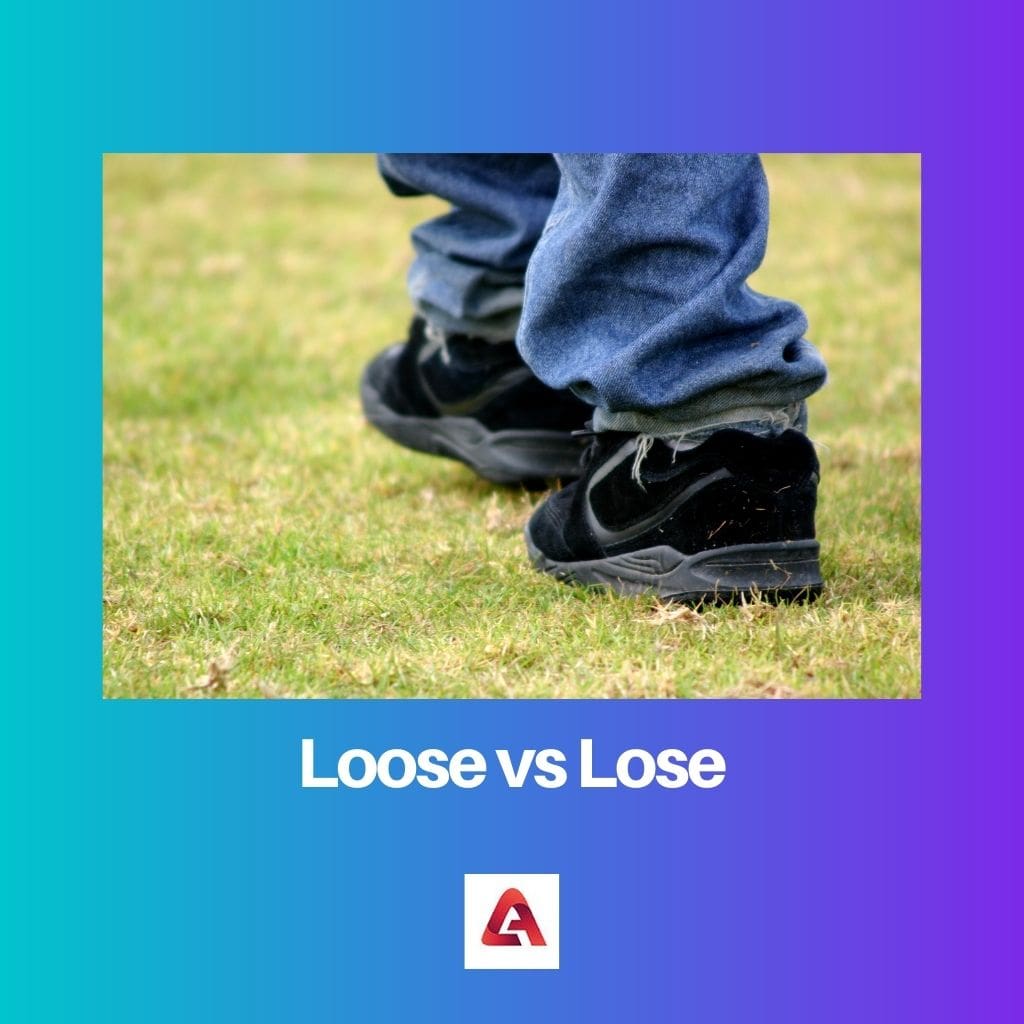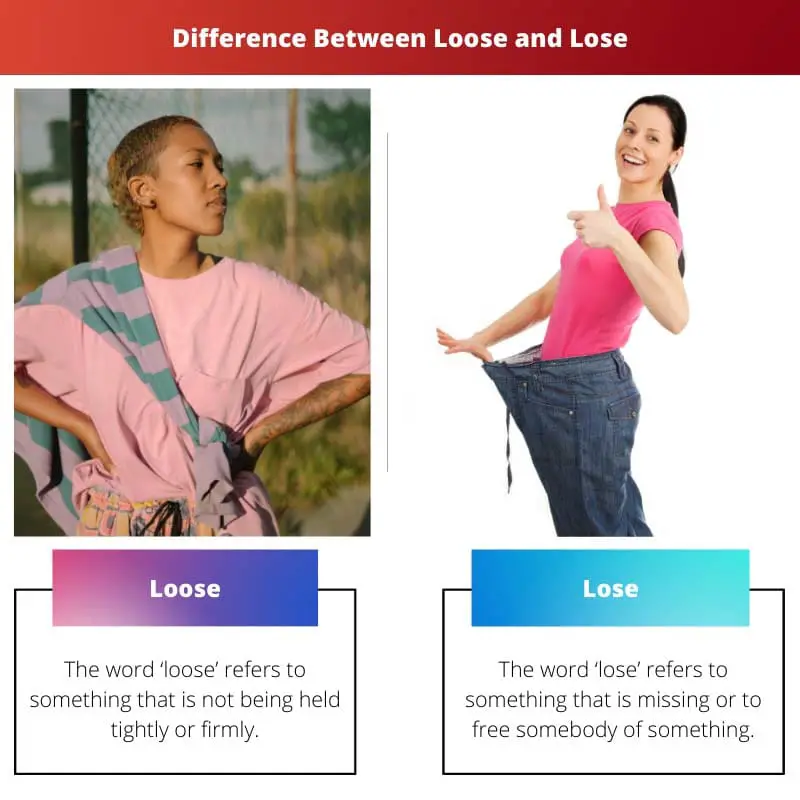“Loose” refers to something not firmly held or fastened, indicating a lack of tightness. For example, loose clothing or a loose grip. “Lose,” on the other hand, is a verb that means to be deprived of or unable to find or retain possession of something. It is often used in the context of losing a game, losing keys, or losing one’s way.
Key Takeaways
- “Loose” is an adjective describing something that is not tight, secure, or restrained.
- “Lose” means to misplace, fail to win or retain, or suffer a loss.
- Using “loose” and “lose” correctly depends on the context, as “loose” describes a state or condition, while “lose” denotes an action or occurrence.
Loose vs Lose
The difference between loose and lose is that Loose is a word that can be used as an adjective, meaning baggy or not-tightly fastened, as a verb, indicating not firmly secured or grasped in place and can also be used as a noun, which is mainly limited to the expression ‘on the loose’. Whereas, Lose can primarily be used as a verb to indicate misplacement, depriving someone of something, parting with or losing ownership of something.

Comparison Table
| Feature | Loose | Lose |
|---|---|---|
| Part of Speech | Adjective (most common), Verb (less common) | Verb |
| Meaning | Not tight, not securely fastened, baggy, relaxed (adjective); To set free, to release (verb) | To fail to win, to misplace something, to no longer have something (verb) |
| Example Sentence (Adjective) | My shoelace is loose, I need to tie it. | The dress is a bit loose on me. |
| Example Sentence (Verb) | We need to loose the horse from the stable. (less common) | I don’t want to lose this game. |
| Mnemonic | Think of a loose goose being able to escape because it’s not tied down. | Think of something being lost and no longer in your possession, like a lost item. |
What is Meant By Loose?
Physical Connotations
Loose Objects
Loose objects generally pertain to items that are not securely attached or fixed. These can include anything from clothing, screws, or even natural elements like rocks. The term is often used to describe items that may move freely or are not in a stable position.
Loose Clothing
In the realm of fashion, “loose” is commonly used to describe clothing that is not tightly fitted to the body. Loose-fitting garments provide comfort and ease of movement, as opposed to tight or form-fitting attire.
Mechanical and Engineering Aspects
Loose Parts in Machinery
In mechanical and engineering contexts, “loose” can be a critical term. Loose parts within a machine or system can lead to inefficiency, malfunction, or even failure. Engineers must carefully ensure that all components are securely fastened to maintain optimal functionality and safety.
Loose Tolerance
In manufacturing and design, “loose tolerance” refers to a permissible range of variation in measurements. A loose tolerance indicates that slight deviations from specified dimensions are acceptable without compromising the quality or functionality of a product.
Social and Behavioral Meanings
Loose Behavior
When referring to human behavior, “loose” can have a more subjective and nuanced meaning. It may be used to describe individuals who are carefree, relaxed, or not adhering to strict social norms. This term is often context-dependent and can be positive or negative based on the situation.
Loose Connections
In interpersonal relationships or networks, “loose connections” refer to associations that are not strong or deeply rooted. Loose connections may lack intimacy or regular interaction, contrasting with tighter-knit relationships.

What is Meant By Lose?
Types of Loss
1. Death and Bereavement
1.1 Definition
The most profound form of loss is often associated with death. Losing a loved one can evoke intense emotions and grief, leading to a complex process of bereavement.
1.2 Emotional Impact
The emotional toll of losing someone can manifest in various ways, such as sadness, anger, denial, or even relief. Understanding the emotional nuances is crucial for navigating the grieving process.
1.3 Coping Mechanisms
Individuals adopt different coping mechanisms to deal with loss, including seeking support from others, engaging in rituals, or exploring therapy.
2. Relationships and Separation
2.1 Relationship Breakdown
Losing a relationship, whether through a breakup or divorce, can lead to a different kind of loss. It involves adjusting to life without a significant emotional or social connection.
2.2 Impact on Identity
The end of a relationship can also impact one’s sense of identity and self-worth, requiring a process of self-discovery and redefinition.
3. Material Loss
3.1 Possessions and Wealth
Loss can extend beyond emotional and relational aspects to material possessions. Losing belongings or financial stability can create a sense of insecurity and upheaval.
3.2 Rebuilding and Resilience
Coping with material loss often involves rebuilding one’s life, adapting to new circumstances, and developing resilience in the face of adversity.
Coping Strategies
1. Emotional Expression
1.1 Acknowledging Feelings
Acknowledging and expressing emotions are essential steps in coping with loss. This can involve talking to others, journaling, or engaging in creative outlets.
2. Seeking Support
2.1 Social Networks
Building and relying on a supportive social network can provide comfort and understanding during times of loss. Friends, family, and professional counselors play crucial roles.
3. Self-Reflection and Growth
3.1 Learning from Loss
Embracing the opportunity for self-reflection can lead to personal growth. Individuals often discover strengths and resilience they were previously unaware of.

Main Differences Between Loose and Lose
- Loose:
- Adjective that describes something not firmly or tightly fixed in place.
- Example: “The knot was loose and easily undone.”
- Can also refer to something not fitting tightly or being too spacious.
- Example: “The pants were loose around the waist.”
- Adjective that describes something not firmly or tightly fixed in place.
- Lose:
- Verb that means to be deprived of, to fail to keep possession of, or to fail to win.
- Example: “Don’t lose your keys; keep them in a safe place.”
- Often used in the context of defeat in a game or competition.
- Example: “They don’t want to lose the championship.”
- Verb that means to be deprived of, to fail to keep possession of, or to fail to win.
- Key Points:
- “Loose” is an adjective describing something not tight or firmly fixed.
- “Lose” is a verb indicating the act of losing possession, failing to win, or being defeated.
- It’s important to differentiate between the two to use the correct word in various contexts.

Last Updated : 08 March, 2024


Emma Smith holds an MA degree in English from Irvine Valley College. She has been a Journalist since 2002, writing articles on the English language, Sports, and Law. Read more about me on her bio page.

Interesting post providing a clear distinction.
This seems like an overcomplication of simple rules.
The post is very comprehensive.
It’s always beneficial to understand the meanings of these words.
This post has been very informative.
There are still some exceptions I don’t understand.
Well explained, the use of grammar is essential in every language.
I found the post to be quite beneficial.
A relevant post for anyone learning the English language.
Great post! I learned the difference between these two words.